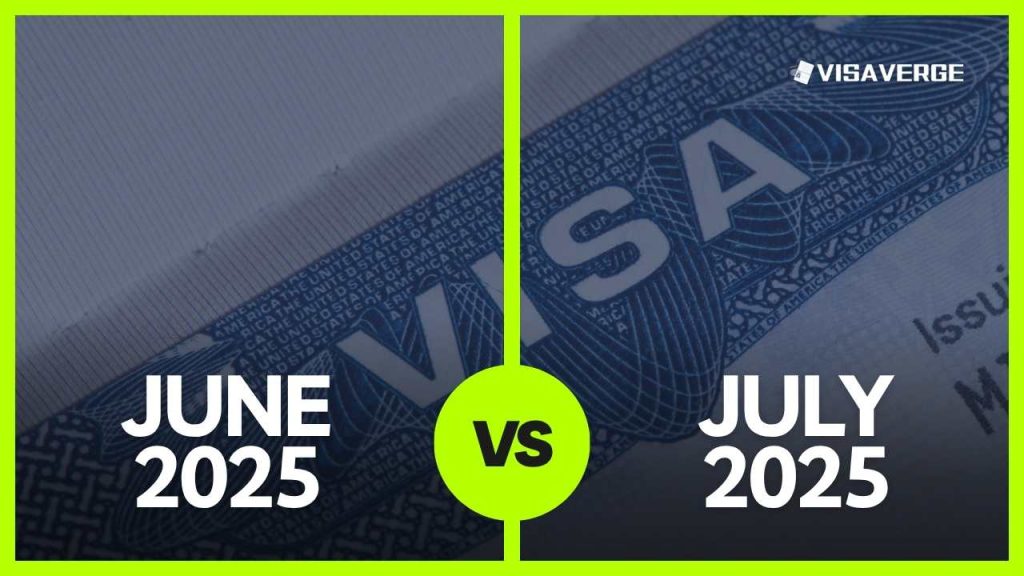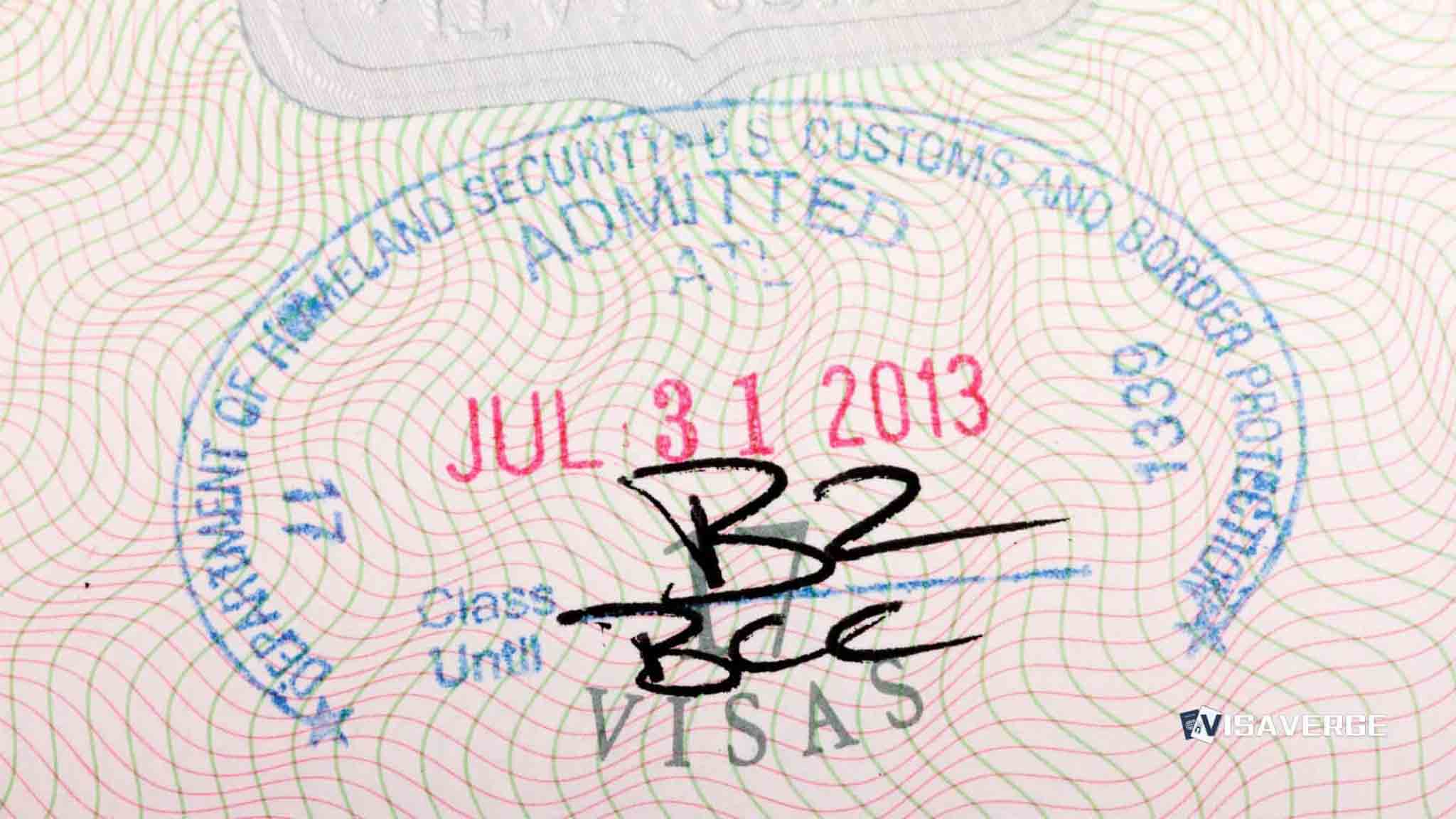Key Takeaways
- A visa is an entry document, while immigration status defines your legal standing during your stay in a country.
- An expired visa affects re-entry; expired status leads to illegal stay, potentially causing fines, detention, or deportation.
- Understanding visas and status is key for compliance, avoiding legal trouble, and making informed immigration decisions.
When discussing immigration, it’s vital to understand the distinction between a visa and status, as these terms, although related, refer to different aspects of someone’s stay in a country. Differentiating these terms can clarify the immigration process and help individuals understand their legal standing better. Let’s explore these concepts in detail, focusing on why an expired visa is not the same as expired status, which carries more significant consequences.
Understanding a Visa

A visa is a document or a sticker placed in your passport that allows you to enter a country. This permission is granted by the immigration authorities of the country you intend to visit, work in, or reside in. Think of it as a ticket that allows you to approach the “gateway” of a country, whether for tourism, business, study, or long-term living. The visa specifies the purpose of your visit and the duration for which you can initially enter the country.
It’s important to note that obtaining a visa does not automatically guarantee entry into the country. On arrival, immigration officers may still question you and require additional verification to ensure you meet all conditions needed for entry. Although rare, they can deny entry if they suspect any issues.
Different countries offer various types of visas, such as tourist, business, student, or work visas. Each type has specific requirements and limitations based on the purpose of your visit. For example, a student visa would only permit activities related to studying at a recognized institution.
What is Immigration Status?
Immigration status, often just called “status,” refers to how you are currently allowed to stay in the country once you are admitted. This status can change over time and is subject to the conditions set by immigration authorities. Unlike a visa, status is not a physical document or stamp; instead, it is a term used to describe your legal standing in the country.
When you arrive, the immigration officer grants you a specific status based on the visa you possess. For instance, if you enter the United States 🇺🇸 on a student visa, your status will be that of a student, often referred to as F-1 status. Your status determines your rights, obligations, and the duration of your stay. Moreover, your status can change; you might extend it, change it to another category like visitor or worker, or adjust it to a permanent residency.
Visa vs. Status: Clarifying the Difference
The confusion between visa and status often arises because they are interconnected yet distinct. Let’s use an analogy: If the visa is your entry ticket, then your status is the permission slip that keeps you in the event or venue—the country, in this case. You need the ticket to get in, but once inside, your behavior and stay are governed by the slip.
Why is an Expired Visa Not as Bad as Expired Status?
Here’s where things get more critical and practical. An expired visa is not the same concern as an expired status. Understanding why is essential for avoiding legal dilemmas.
- Expired Visa: An expired visa primarily affects your re-entry into a country. For example, if you have an expired U.S. visa but are still in the United States 🇺🇸 legally, you face no penalties simply because the visa is no longer valid. The issue arises if you leave and want to return; you’d need to obtain a new visa to re-enter.
-
Expired Status: On the contrary, an expired status is a significant issue. It means you are staying illegally in the country as your authorized period of stay has ended. This situation can lead to various consequences, such as fines, detention, or deportation. Furthermore, it might harm your chances of being granted entry in the future, as many countries track overstays rigorously.
To illustrate, imagine you’re a student in another country. Your visa might have initially been valid for a short time, say a few months, through to complete the paperwork. However, once inside, your student status allows you to remain for the duration of your studies, provided you meet all conditions set by the authorities. If your studies are about to end, and you don’t extend your student status or switch to another category (like work or visitor), you could face penalties.
Implications for Different Groups
Both expired visas and statuses have implications for various groups, including tourists, students, and workers.
Tourists with an expired status might face deportation, particularly if they intentionally extended their stay without proper authorization.
Students whose statuses are not renewed typically must return to their home country upon completion of their education unless they apply for a change of status or an extension of their current one.
Workers may face job termination, and their ability to work might be affected if their status becomes void.
Employers, too, must understand these distinctions to avoid hiring individuals who are not legally permitted to work, as doing so can result in fines or other legal action against the organization.
Historical Context and Policy Evolution
The distinction between visas and status is not arbitrary. Historically, as countries developed immigration policies, they needed systems to regulate both entry and stay. The visa system allows governments to pre-screen foreign nationals before letting them enter. The status mechanism ensures that those who enter abide by the rules that govern their stay, allowing adjustments as circumstances change.
Enforcement and Authority
Immigration authorities strictly enforce the rules around visas and status. Agencies like the U.S. Citizenship and Immigration Services (USCIS) and Customs and Border Protection (CBP) play crucial roles in monitoring compliance. Violations can lead to immediate actions like detention or removal by border security forces. Furthermore, legal precedent exists where courts have upheld stringent measures against status violations, underscoring their severity.
Recent Changes and Debates
The topic of visas and status is frequently debated, especially in countries with large immigrant populations. Changes in immigration policy can influence how visas and status are handled. For example, recent amendments aimed at streamlining visa processes could enhance efficiency, but critics might argue they compromise security or fairness.
Ongoing debates often focus on whether current systems adequately serve national interests and human rights. Proponents of stricter regulations may cite security and job-market impacts, while opponents emphasize the humanitarian obligations to facilitate legal and easy-to-understand pathways for immigrants.
Misconceptions and Real-World Examples
There are common misunderstandings about visas and status that can lead to costly mistakes. Many assume that a valid visa is enough to remain in a country and neglect to understand the necessity of maintaining proper status. Others believe that once inside a country, no further actions are required to comply with immigration laws.
Consider a real-world example of a student who completes their degree but fails to change their status or leave the country. They may become confused when they face legal issues because their visa was valid, but their status wasn’t extended or changed.
Consequences of Non-compliance
Failing to observe the difference between visa validity and maintaining legal status can have severe repercussions. Overstaying can result in being barred from re-entering a country for several years or facing fines. In extreme cases, individuals might face detention or deportation, creating significant disruptions in personal and professional life.
Pending Legislation
Pending legislation often aims to address inefficiencies and close loopholes between visas and status regulations. These changes can impact how long one might wait to have a status extended or altered and can introduce new categories of visas or statuses based on labor market needs or changes in educational policies.
Resources for Further Information
Individuals who wish to delve deeper into their specific circumstances can consult official immigration websites, which often provide comprehensive guides on visa categories and status regulations. For instance, the U.S. Department of State offers detailed information on visas and the rules governing entrance into the United States 🇺🇸. Similarly, for status-related inquiries, the U.S. Citizenship and Immigration Services (USCIS) provides resources about status extensions, adjustments, and other relevant processes.
Understanding the subtle yet significant difference between a visa and status is paramount for any traveler or immigrant. While an expired visa might not disrupt your stay unless you leave and try to re-enter, an expired status can lead to severe legal consequences. Staying informed about these nuances can help navigate the complexities of immigration and ensure that one remains compliant with the laws of their host country. As VisaVerge.com suggests, knowing your immigration terms can make a world of difference.
Learn Today
Visa: A document or stamp in a passport granting permission to enter a country for a specific purpose and duration.
Immigration Status: Legal standing defining how long and under what conditions a person can stay in a country.
Expired Visa: A visa that no longer permits re-entry into a country, though the person may remain if their status is valid.
Expired Status: Indicates unlawful presence when a person’s authorized stay in a country has ended, leading to potential legal consequences.
U.S. Citizenship and Immigration Services (USCIS): U.S. government agency managing lawful immigration, including status changes and visa processing.
This Article in a Nutshell
Visas and status: two critical yet often confused terms in immigration. While a visa grants access, it’s your status that defines your stay. An expired visa impacts re-entry, but losing status means you’re overstaying illegally, risking fines or deportation. Understanding these differences ensures compliance and smoother international living.
— By VisaVerge.com
Read more:
• Applying for EB-5 Visa Without Legal Status
• China’s Crackdown on Student Status Fraud
• Understanding H-1B Visa Change of Status
• Effects of Florida’s Immigration Status Checks on Healthcare
• H-2B Visa Cap Update for FY 2025













